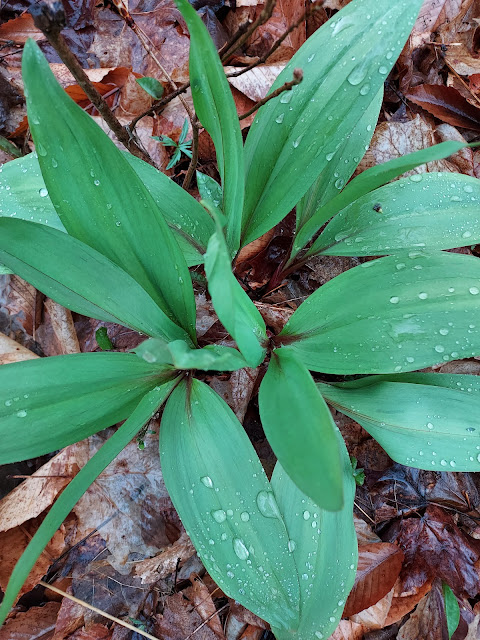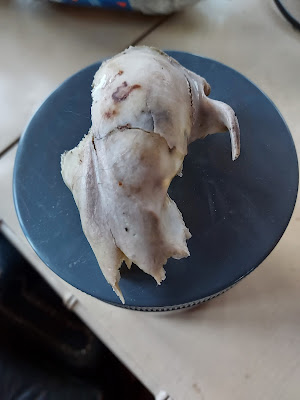Domestic vs. Wild
Let’s lead with Sunny Juliet, looking back to see how far behind her momma is. We start out untethered when we leave the house, but I have taken to employing the leash on return to ensure that we arrive home together. Sunny doesn’t try to evade the leash. Neither captive nor wild canine, she generally accepts what I propose--though if her opinion differs from mine she will let me know. Oh, yes, Sunny still has opinions!
 |
| When she was an opinionated little puppy... |
On the evening of Christmas Day—not Christmas Eve but late Wednesday, on our final sortie of the holiday at home—Sunny and I were startled to hear from across the fields a terrifying scream. Not a hooting owl or a yipping coyote but something neither of us had heard before, and I had to do some online searching later, back in the house, to identify the sound as coming from a fox. Talk about the hair standing up on the back of your neck! A screaming fox is a truly alarming wild sound!
When we’d started out the first time that day for our morning walk, the bells of St. Wenceslaus greeted us, so our Christmas Day 2024 was bookmarked by two very different voices in our country neighborhood, morning church bells and evening fox scream.
Bookstores and Libraries Are Not in Competition!
Once again the other day, someone in my bookstore referred to our township librarian as my “competition,” and once again I made my usual correction: The correct term is colleague. Booksellers and librarians are colleagues, not competitors. Other booksellers with bricks-and-mortar stores are also colleagues, not competition. (The online behemoth is something else.) There is no necessity for buying every single book you want to read, and I use the library myself. On the other hand—and I should probably explain this, too, when I make the point about librarians being my colleagues—a house without family books is incomplete as a home, and all children deserve to have a few books of their very own, books that belong to them. I’m not going to repeat today everything I’ve written before about bookstores and libraries, though, so here’s a link if you want more than this one paragraph.
 |
| Leelanau Township Library on Nagonaba St. |
Past Light on Present Days
Living wholly in the past is incompatible with sanity, but living wholly in the present is no great shakes, either. Give up memories? Give up history? No, thank you. I spent a good part of 2024 in 18th- and 19th-century North America, through both fiction and nonfiction, motivated in part by a wish to retreat from the 21st century, but also, as there is no escaping one’s own time, again and again in my reading finding events and thoughts from our nation’s past shedding light on our present.
It was James Boyd’s novel, Drums, set in the early 1770s, that got me started. My main takeaway from this book was that ours is a country that was born splintered and divided. Not every American wanted to break away from England. All on the North American continent did not see eye to eye with each other. Then I read Hodding Carter’s The Lower Mississippi, a volume from the “Rivers of America” series, and that strengthened my insight about our divided origins. What we usually learn in school about the region of our country covered in Carter’s book begins only with the Louisiana Purchase and visits the area only once again, briefly, for the Battle of New Orleans but otherwise? The Lower Mississippi, by contrast, concentrates on a complete history along the river between St. Louis and New Orleans, with a cast of characters including Spanish, English, French, European-American, African-American, and Native American, with economic and military and political plans and objectives creating dissension at every turn. A country born divided….
Neither Daniel Mason’s North Woods and Ariel Lawhon’s The Frozen River is set exclusively in the 18th century, but both continue a theme, for me, of the ways in which politics and war impinge on individuals and families and leave marks that endure sometimes past specific memories. While Mason’s time scope is broad, he limits his spatial canvas to a few acres of woods in western Massachusetts. Lawhon also places her two main speaking characters, both Black women, in a small community, a Canadian village peopled exclusively by refugees from American slavery. As different as they are, both novels incorporate voices and stories from far away and long ago, Mason more chronologically, for the most part, Lawhon in a brilliant, dizzying splendor of tales told and read within other stories shared, stories from the Underground Railway, the War of 1812, and complex relationships between indigenous peoples and those escaping slavery. Neither of these novels offers simple reading, but the challenges they present are well worth the effort.
Also during 2024 I read a couple of accounts by Englishmen who spent in the early United States and Canada. One of them, disappointed in his hopes for clerical preferment in his native land, hoped for more success in the U.S. but, again disappointed, moved to Canada and might have made a permanent home, except that his wife did not find Canadian life sufficiently civilized. Disappointed in their hopes, they returned to England after only a few months in the New World. The other man had no intention of transferring his allegiance to America, but he made a thorough, three-year tour of the country, including the Southern slave states and the Western frontier. If one were going to read only one of the two accounts, I recommend that of James Stuart, Three Years in North America, over the bare three-month account of the more self-seeking Rev. Isaac Fidler.
Margaret Van Horn Dwight’s A Journey to Ohio in 1810 told in diary form of her travels from New Haven, Connecticut, to Warren, Ohio, and was as entertaining as it was eye-opening. We like to think that settlers of that time were sober, God-fearing folk, but Margaret tells over and over of Sabbath drunkenness and “so much swearing … I have never heard before during my whole life,” such that when she encounters a Pennsylvania Dutchman not given to profanity she is amazed. As Margaret was traveling with a deacon and his wife, she had a few observations to make on religion and the clergy, but hers is a very personal account, written for her best friend; however, while not pretending to be anything else, it is a vivid picture of travel at the time.
And then I come to a 2007 ARC, The Genius of America: How the Constitution Saved Our Country and Why It Can Again, by Eric Lane and Michael Oreskes. I am only halfway through this little paperback (which is already on my current new book order list), but the authors’ claims are that (1) the writing of the Constitution should be regarded as a second American Revolution and that (2) the Constitution’s ideas are our national political conscience—“conflict within consensus, compromise, representation, checks and balances, [and] tolerance of debate.” The authors wrote their book, they say, because they see Americans “losing touch” with these basic Constitutional values, “most particularly a commitment to compromise and a tolerance for competing ideas.”
Michigan’s Representative Dan Kildee, who has served the 8thdistrict in the state Congress for twelve years, said in a recent radio interview that he thinks citizens often mistake disagreement for dysfunction, that disagreement is valuable and only becomes dysfunction when legislators place a higher priority on ideology than on collaborating and compromising to solve problems. This accords with Oreskes and Lane’s thesis. Unfortunately, what we see in Congress these days has been exactly that: an exaltation of ideology and a refusal to compromise.
The Framers of the Constitution debated the question of state power and federal power: Which should have priority? In what areas? They wrangled over how states would be represented in the national legislature—equally or according to population—and whether to have one legislative house or two. And when all the compromises had been accomplished and the Framers were reasonably content with what they had put together, they submitted their document to the American public, some of whom still hoped that their new government would have a king at its head. After all, monarchy was the form with which they were familiar.
“No other nation,” the authors note, “had ever submitted its Constitution to its people.” Neither the Declaration of Independence nor the various state constitutions had been submitted for popular ratification. Patrick Henry (“Give me liberty or give me death”) was appalled (“inflamed,” the authors write) by the phrase “We the people,” which he saw as pledging allegiance to a centralized power at the expense of the states. And “in the fall of 1787 the People were divided.” There was strong feeling among many that the Constitution needed the addition of a Bill of Rights—and yet the Constitution had to be ratified by the states before it could be amended, and it took until 1791 before the amended Constitution, including the Bill of Rights, was finally ratified.
Had it not been for compromises all along the way, the Constitution of the United States would never have come into being at all.
What would a Constitutional Convention look like today? Here are a few thoughts (not mine).
Looking Back and Looking Ahead
Many, many people found their way to Northport and to Dog Ears Books for the first time in 2024. What was most gratifying to me personally was how many people, both newcomers and repeat visitors, expressed appreciation and gratitude for my bookshop’s existence and the quality of its offerings. That’s a good feeling, knowing that what you are doing with your life matters to other people, and I had that good feeling frequently in the past year. Thank you so much, friends! It means more to me than I can express in words!
Now, on the way to the 32nd anniversary of Dog Ears Books in July 2025, I’m here for another winter, with a short week and short hours while the nights are long and the village streets—let’s say, “uncrowded.”
The shop will be closed on Thursday, January 9, for our national day of mourning and the state funeral of President Jimmy Carter.
After that, barring holidays, the winter schedule will be Wednesdays, Thursdays, Fridays, Saturdays, 11 a.m. to 3 p.m. (weather and roads permitting, of course). And new book orders only once a month during the winter. That’s the plan.
Again, thank you for your custom, your appreciation, and for, as Mr. Rogers used to say, being my neighbor--in this hard, cold, wonderful, beautiful, miraculous world of light and life!
 |
| A patch of blue appeared! |


































